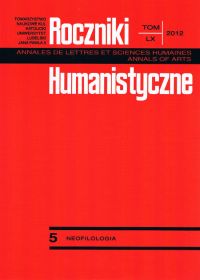If Art is What Makes us Human, Can it Relieve the Pain of Being Human?
Abstract
Two contemporary British novels, Never Let Me Go and Saturday, suggest that art (the ability to respond to art with deep affection and the ability to be creative) is indicative or even constitutive of humanity. The essay considers in detail some implications of this hypothesis with reference to the concepts of art and art therapy. In particular, it seems that the significance of art for humanity might be explained if art is interpreted as primarily a cognitive activity (whose main object is the self) and if self-awareness (interest in one’s inner world) is perceived as essential for humanity. At the same time the hypothesis in question seems to undermine the idea of art therapy, since if art makes us human, it can hardly relieve the pain of being human, especially if, as argued by Dennett, awareness and self-awareness play the fundamental role in the experience of suffering. Art’s therapeutic function may, however, be defended if therapy is defined as assistance in man’s effort to accept suffering as inevitable part of human life.
References
Borowiecka, E. Poznawcza wartość sztuki. Lublin: Wydawnictwo Lubelskie, 1986.
Conrad, J. “The Nigger of the ‘Narcissus.’” In: Three Great Tales. New York: Random House, [1958], 1-134.
Dennett, D. C. Natura umysłów. Trans. W. Turopolski. Warszawa: Wydawnictwo CIS, 1997.
Dutton, D. The Art Instinct: Beauty, Pleasure and Human Evolution. Oxford: Oxford UP, 2009.
Gutowski, P. “Prawda — rzeczywistość — sztuka.” In: Prawda natury prawda sztuki: studia nad znaczeniem reprezentacji natury. Eds. R. Kasperowicz and E. Wolicka. Lublin: Towarzystwo Naukowe KUL, 2002, 191-206.
Ishiguro, K. Never Let Me Go. London: Faber and Faber, 2005.
Levenson, M. H. A Genealogy of Modernism: A Study of English Literary Doctrine 1908-1922. Cambridge: Cambridge UP, 1984.
Lewin, R. Wprowadzenie do ewolucji człowieka. Trans. A. J. Tomaszewski. Warszawa: Prószyński i S-kA, 2002.
Lodge, D. “Consciousness and the Novel.” In: Consciousness and the Novel. London: Penguin, 2003, 1-91.
Lodge, D. “Literary Criticism and Literary Creation.” In: Consciousness and the Novel. London: Penguin, 2003, 92-113.
McEwan, I. Saturday. London: Jonathan Cape, 2005.
Schorer, M. “Technique as Discovery.” In: 20th Century Literary Criticism: A Reader. Ed. D. Lodge. London: Longman, 1983, 387-400.
Teske, J. K. “Filozofia nauki i sztuki z perspektywy metodologii Karla Poppera.” In: Studia Philosophica Wratislaviensia 4.3 (2009): 27-52.
Copyright (c) 2012 Roczniki Humanistyczne

This work is licensed under a Creative Commons Attribution-NonCommercial-NoDerivatives 4.0 International License.





